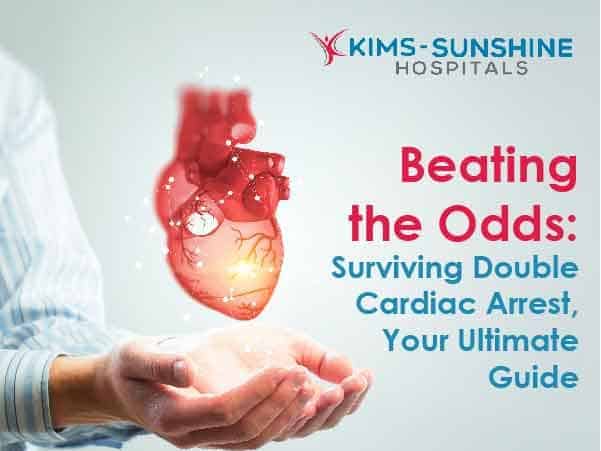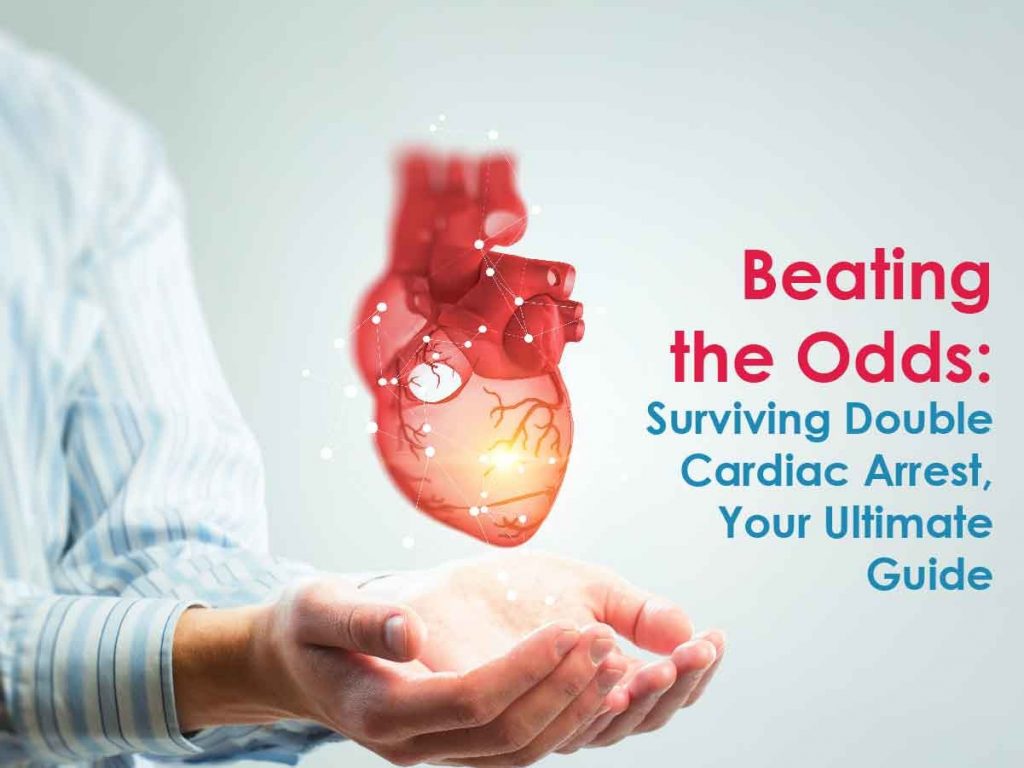
Beating the Odds: Surviving Double Cardiac Arrest, Your Ultimate Guide
By Dr. Akash Shastry, MBBS, MD (DNB) Cardiology
 Double Cardiac Arrest: What You Need to Know and How to Improve Survival Chances
Double Cardiac Arrest: What You Need to Know and How to Improve Survival Chances
It beats tirelessly, all day, every day; the human heart is an extraordinary organ in the body only to keep us alive. But what do we have as a backup when it fails, stumbles, or stops not once, but twice? That is the scary truth of a double cardiac arrest, a rare and possibly life-threatening medical emergency that commands our attention.
Dive into the fascinating world of Double Cardiac Arrest and discover the secrets to boosting survival rates! From causes to crucial first-aid hacks, this blog is your ultimate guide to keeping hearts dancing!
Understanding Double Cardiac Arrest
It’s a matter of life and death when your heart suddenly stops beating, causing a Cardiac Arrest. In scenarios where a person goes through two cardiac arrests back-to-back within seconds or minutes of each other, they are having a double cardiac arrest. This is an exceedingly alarming and uncommon happening
The first occurrence of cardiac arrest is often caused by a problem with the heart’s electrical system, like ventricular fibrillation or ventricular tachycardia. These conditions result in the ineffective pumping of blood to the vital organs in the body by disrupting the heart’s normal rhythm pattern.
As a result of complications from the first attack, underlying heart conditions and other medical issues, one is susceptible to a second cardiac arrest. The quick succession of a second cardiac arrest puts the body in a greater strain on the body, making survival a challenge.
Causes of Double Cardiac Arrest
- Heart Disease: The most common cause of a double cardiac arrest is an attested heart condition. For example, Coronary artery disease, which narrows down the blood vessels supplying to the heart, can cause a heart attack. A person can have a second heart attack in quick succession as a result of the heart’s weakened state.
- Arrhythmias: Arrhythmias or Abnormal heart rhythm conditions like ventricular fibrillation or ventricular tachycardia can trigger the first cardiac arrest. The ignorance or ill-treatment of these conditions can cause a repeat incident, and therefore, a second cardiac arrest.
- Cardiomyopathy: Cardiomyopathy weakens the heart muscle. This deprivation of strength in the heart makes it more susceptible to a double heart attack.
- Electrolyte Imbalances: Disturbances in the Electrolyte Balance of the body can cause disruptions in the heart’s electrical activity and trigger a heart attack. Persistent imbalance can cause a second heart attack.
- Medication and Drug Reactions: Some medications and illicit drugs can cause abnormal heart rhythms, leading to cardiac arrest. An excessive intake or remainder of the substances in the body can cause a second episode.
Improving Survival Chances
The rate of survival for someone experiencing a double cardiac arrest is dishearteningly low, but quick and useful action can make a huge difference. Here’s how you can improve your or a loved one’s survival chances:
- CPR (Cardiopulmonary Resuscitation): If you witness someone having a cardiac arrest, call for an ambulance and start CPR. Chest compressions and rescue breaths can assist in maintaining blood circulation and oxygen supply until professional help arrives.
- Automated External Defibrillator (AED): AEDs are portable heart rhythm devices that help analyse heart rates and possibly deliver a small electric shock to help normalise the heartbeat if required. Using an AED can possibly be a lifesaver for people susceptible to cardiac arrests.
- Early Defibrillation: The sooner one can defibrillate a person, the better their chances of survival, because time is of the essence. AEDs are designed for use by bystanders and provide clear instructions on how to use them.
- Risk Factor Management: If you or anyone you know has heart conditions or high-risk factors, like high blood pressure, high cholesterol or diabetes, it is important to work with a medical professional to manage these factors effectively If you have known heart conditions or risk factors, such as high blood pressure, high cholesterol, or diabetes, work closely with your healthcare provider to manage them effectively. Thus, reducing your risk of cardiac arrest.
- Medication Adherence: Take your heart condition medication as prescribed by a physician to help manage the condition. Skipping or adjusting medications can increase the risk of arrhythmia.
- Avoid Triggers: Steering clear of heart condition triggers like alcohol and drug use is important to stay away from any heart ailments. One can also seek help to control their addiction to these or any other substances.
- Regular Check-ups: People who are genetically or lifestyle-based susceptible to heart conditions should regularly check up with their doctors. Even if you feel healthy, schedule regular check-ups with your healthcare provider. They can detect and address underlying heart issues before they lead to cardiac arrest.
A double cardiac arrest is an extremely scaring , but rare occurrence, but the knowledge an dpreparedness against it is what makes the difference. By interpreting the causes and taking steps to improve the chances of survival of a patient, you can face this dire situation and expect better outcomes.
In the event that you or someone you know is suffering from or feels symptomatic of a double cardiac arrest or any other cardiological ailments, you can book an appointment with the most skilled cardiological specialists at the best cardiology hospital in Hyderabad, KIMS-Sunshine Hospitals, Secunderabad. For a pain-free, healthy lifestyle, the cardiology hospital near you can provide excellent medical guidance and can help make wise decisions with your heart health.
FAQs
Q. What is a double cardiac arrest?
A. A double cardiac arrest is a rare and critical medical condition in which both the upper chambers (atria) and lower chambers (ventricles) of the heart stop functioning at the same time, resulting in a complete cessation of heart activity and circulation. It is a life-threatening situation that necessitates immediate medical intervention such as CPR and defibrillation.
Q. Can you have cardiac arrest twice?
A. Yes, multiple cardiac arrests are possible, but they are extremely rare and life-threatening. To increase the chances of survival, each episode necessitates immediate medical attention and intervention.
Q. What causes multiple cardiac arrests?
A. Multiple cardiac arrests are usually the result of underlying medical conditions like severe heart disease, arrhythmias, or electrolyte imbalances. These conditions can disrupt the electrical system of the heart, resulting in recurrent cardiac arrest episodes.
Q. Why do multiple cardiac arrests happen?
A. Multiple cardiac arrests can occur due to severe underlying heart conditions, such as coronary artery disease or arrhythmias, which make the heart more vulnerable to successive episodes of life-threatening arrhythmias or cardiac events.
Q. How many cardiac arrests can you survive?
A. Surviving multiple cardiac arrests is extremely rare, and the chances get smaller with each one. Immediate medical attention and effective interventions are critical for increasing the chances of survival.
Q. Which is the best hospital for the treatment for double cardiac arrests?
A. If you or someone you know is suffering from or feels symptomatic of a double cardiac arrest or any other cardiological ailment, you can schedule an appointment with the best cardiology hospital in Hyderabad, KIMS-Sunshine Hospitals, Secunderabad.






